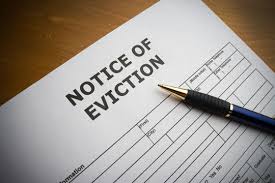Posted in Real Estate Law

If you have a non-paying tenant, the obvious place to start is with your commercial rent or lease agreement. This document will serve as the foundation of your argument and will determine your possible courses of action. Typically, with a commercial lease, the agreement will have clearly defined tenancy terms, which means that your tenant will only have three days to respond to a pay or quit notice to pay the past-due rent or vacate the property, according to Section 1161 of the California Code of Civil Procedure. Your notice should include the amount of back-rent due along with a specific warning that they will face eviction if they fail to pay.
It’s critical that your 3-day notice be as accurate as possible. Make sure that the legal address of the property in question is correct and that all tenants and subtenants are listed on the notice. Failure to include any of these details could derail your eviction in court by giving your tenants recourse on a technicality.
Once you submit your notice, your tenants have exactly three days to pay their back-due rent. If your tenant has failed to remedy the situation after three days, it’s essential that you follow up with the next step immediately. Failure to follow the timeline will not look good for your case. Be diligent and follow-up after three days with the Unlawful Detainer – otherwise known as the eviction notice. Also note that if your tenant submits full payment within the three day period, you must accept the payment and you may not move forward with the eviction unless there are other circumstances – such as a breach of contract. In that case, you must file an entirely new notice and begin the process anew.
If you need to file an unlawful detainer, it’s best to hire an experienced commercial landlord-tenant attorney to help. Many minor details can render your eviction notice unlawful so I wouldn’t suggest risking it. A landlord-tenant lawyer will review your lease or rent agreement, help you to decipher your landlord rights and advise you on the best course of action in the case that your tenants contest the eviction.
Once your tenant is served with the unlawful detainer notice, they will have five days to respond. One of two things will happen. Either the tenant will fail to contest or respond to the eviction, thereby giving you the right to request a judgment for possession. Once granted, you will be free to place a lock on the property to prevent the tenant from entering the premises. If, however, the tenant responds to or contests the eviction notice, the issue will proceed to court. Because of the time sensitivity of the situation, unlawful detainer issues are generally scheduled within 15 days.
If your unlawful detainer issue moves to court, it will be pertinent that you have proper legal counsel to represent your property interests. Don’t wait until then, though, to find a good attorney. If you are struggling with a non-paying tenant, you should call The Law Offices of Tony T. Liu today to review your lease agreement and determine your rights right away.
